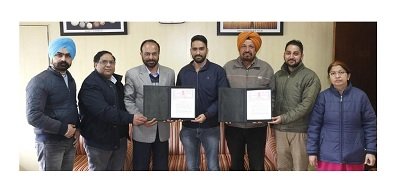According to the experts, intensification and diversification has added to the risk factors of the spread of new and emerging aquatic diseases in aquaculture
Department of Fisheries, Ministry of Fisheries, Animal Husbandry and Dairying, Government of India organised a webinar on National Surveillance Programme for Aquatic Animal Diseases: A Step towards Establishing Disease Governance System in India. The event was attended by more than 150 participants including officials of the Department of Fisheries, ICAR institutes, GoI and fisheries officials of different States/UTs, faculties from state agriculture, veterinary and fisheries universities, entrepreneurs, scientists, farmers, hatchery owners, students and stakeholders from aquaculture industry across the country.
The welcome address was given by IA Siddiqui, Fisheries Development Commissioner, DoF along with the introduction of the theme of the webinar and the distinguished panellists Sagar Mehra, Joint Secretary (Inland Fisheries); Dr Joykrushna Jena, Deputy Director General (Fisheries Science), ICAR, New Delhi; Dr Iddya Karunasagar, Advisor (Research and Patents), Nitte University, Mangaluru; Dr AG Ponniah, Former Emeritus Scientist and Former Discipline Leader, WorldFish Centre, Malaysia, Dr KK Lal, Director, ICAR- National Bureau of Fish Genetic Resources, Lucknow; Dr Neeraj Sood, Principal Scientist ICAR- National Bureau of Fish Genetic Resources, Lucknow; V Balasubramaniam, General Secretary, Prawn Farmers’ Federation of India, Bengaluru and other participants.
Shri Sagar Mehra, Joint Secretary (Inland Fisheries), in his opening remarks mentioned that aquaculture production through intensification and diversification has added to the risk factors of spread of new and emerging aquatic diseases in aquaculture.
During the technical session, Dr Joykrushna Jena, Deputy Director General (Fisheries Science), ICAR, New Delhi, set the context for the webinar and stated that India is a vast country with state divergent levels of capabilities and fisheries priorities hence surveillance programme for monitoring and controlling spread of diseases of national and international concern has become a primary requirement for effective health management and ultimately for sustainable aquaculture.
Dr Jena further stated that the National Surveillance Programme for Aquatic Animal Diseases (NSPAAD) of India has made its own example in establishing a coordinated surveillance programme for aquaculture.
Dr Neeraj Sood, Principal Scientist ICAR- National Bureau of Fish Genetic Resources, Lucknow delivered a detailed presentation on NSPAAD along with the status of the project in the country and the future aims of the project.
Dr Iddya Karunasagar, Advisor, Nitte University, Mangaluru focussed on strategising aquatic animal health management based on disease surveillance through a knowledge filled session. Dr AG Ponniah, Former Emeritus Scientist and Former Discipline Leader, World Fish Centre, Malaysia delivered an informative session on emergency response in case of detection of exotic aquatic diseases and V Balasubramaniam, General Secretary, Prawn Farmers’ Federation of India briefed about the industrial approach and the need of fisheries and aquaculture sector for disease surveillance in shrimp aquaculture.
The webinar concluded with a vote of thanks proposed by Dr SK Dwivedi, Assistant Commissioner, DoF.
According to the experts, intensification and diversification














